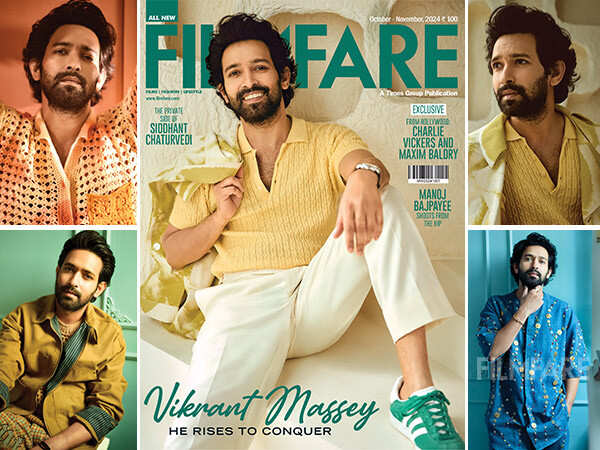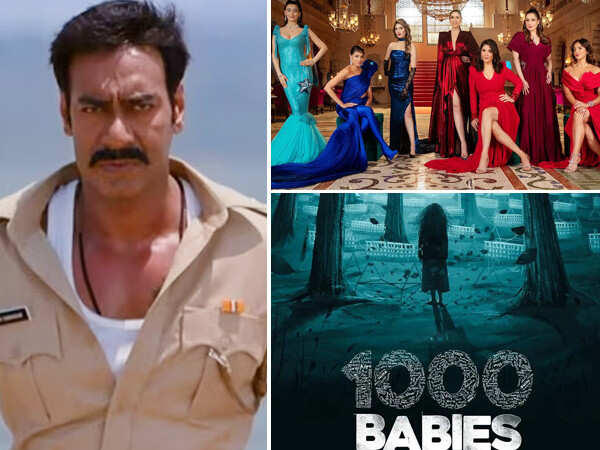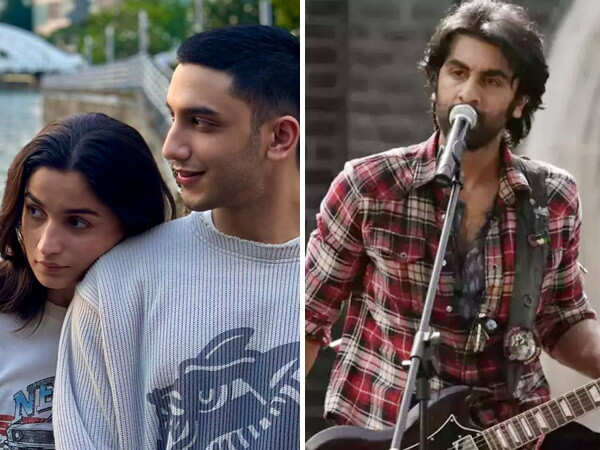COVER STORY: Vikrant Massey on Sector 36 being a father and more
17 min read
It’s his time under the sun, right now. He’s been taking baby steps in showbiz for a while now… Looks like he’s finally coming into his own.. If you got a glimpse of his talent in A Death In The Gunj, he hit it out of the park in 12th Fail… and while your were still savouring his performance in 12th Fail, he hit you in the solar plexus with another gritty performance in Sector 36. And we won’t even mention movies like Haseen Dillruba and Phir Aayi Hasseen Dillruba… which only cemented the fact that he’s mighty talented.. Yes, the talented Mr Massey. Clearly, it’s a great time to be Vikrant Massey, right now… Success is cheering him on. He’s won his first Filmfare for 12th Fail. Filmmakers are wooing him.. Aanand L Rai thinks he is the only one who can fit into late Irrfan Khan’s shoes. No mean compliment that. His personal life is blissful. He’s just become a father and that adds to his blithe spirits… looks like Massey saheb just can’t take a misstep at the moment. Touchwood!
Cut to the photoshoot then. His excitement is palpable. Also understandable. This is his first cover ever.
It’s a dream come true… He’s been ticking all the boxes, alright. Talk to him for ten minutes and you realise that success sits easy on his shoulders. He smiles wholeheartedly, hugs easily. And he just as easily allows the camera to drool over him. We catch up for the interview two days later. I have lots to ask him and he has lots to say… makes for an exciting conversation… read on
What’s your current state of mind?
I’m genuinely happy right now. After a long time,
I feel content, especially with the wonderful addition to my life—my son, Vardaan. Work has been going well too; people have embraced 12th Fail warmly, and Sector 36 has also garnered a lot of appreciation. It’s gratifying to see that the messages we aimed to convey through our stories have resonated with the audiences. On top of all that, I’m thrilled to be featured on the cover of Filmfare for the first time—a childhood dream come true! I remember flipping through Filmfare magazines at the barber shop, always aspiring to be an actor. Being on that cover has been a goal for as long as I can remember, and I always told myself that when it happens, I’d truly feel like I’ve arrived. What more could I ask for?
We’re still disturbed after watching Sector 36. What kind of impact does a role like that have on you?
When I signed up for the film and during the shooting, I was fully aware that it would have a profound effect on me personally. I mentally prepared myself for it and made a conscious effort not to bring the character home with me.
Is that possible?
It’s not entirely possible but I found that certain scenes presented an opportunity to showcase a different side of myself. While shooting those scenes, I often felt my hands and feet go cold, not due to lack of preparation but because of the emotional weight of the story I was telling. It really hits hard. I’m glad that my past experiences helped me prepare for Sector 36. In films like A Death In The Gunj and Love Hostel, my emotional and mental health took a toll. So when I signed up for Sector 36, I told myself, “Vikrant, approach this character, Prem Singh, professionally. Work hard, but make sure you don’t get too engrossed into it. Your mental and emotional well-being will go for a toss.” Shooting away from home adds another layer of challenge. You’re not returning to your family after a long day; instead, you’re going back to a hotel, which can be daunting. There were moments on set when I felt genuinely scared. I wouldn’t say I was nervous, but I definitely felt that cold sensation in my hands and feet while filming. Which is why I was adamant about not bringing the character home with me.
Which scenes were particularly scary to film?
One significant scene is the one with Ali. During that scene, I was very aware of the things I was saying and doing. I didn’t want to traumatise the child actor involved. While we were filming, I had to remind myself that, yes, I was in character, but what about the boy? Did he understand what was happening? I saw him not just as an actor but as a person. So, Aditya (Nimbalkar), our director, and I made a conscious decision to avoid emotionally scarring him. The content we were dealing with was uncomfortable, so we took an entire day to shoot a four-hour scene, ensuring we approached it with care.
Doing an inspirational film like 12th Fail and then transitioning to a negative role in Sector 36 takes a lot of guts.
I appreciate you using the word “guts” because it often goes unnoticed. Many reviews this year, including one from Filmfare, acknowledged the bravery in my choices, which I’m grateful for. Sometimes, we focus too much on box office numbers and popularity, overlooking the hard work and passion that go into telling meaningful stories. These narratives are important, especially given the ongoing issues in our country. Despite our progress, reaching the moon and Mars, basic needs for a civil society still go unaddressed. We often ignore the collective ignorance of those who are privileged. When Bodhan Roy Choudhury wrote this script, it stemmed from a group of aspirational guys wanting to tell a necessary story. We weren’t sure if the audiences would resonate with it. While it’s natural to hope for acceptance, there’s also a cynicism about how people often shy away from such themes. So, when a film like Sector 36 is embraced, it brings immense joy. It feels like I’ve contributed something meaningful through
my work.
How do you prepare for a role like this? Do you have to access dark areas?
Every person has their own dark areas, but I’m not a trained actor, so what happens to me? My preparation comes from different sources. I draw inspiration from the books I read, my travel experiences and staying informed about current affairs. I’m very much a part of this society; I don’t feel detached from it. There’s a collective conscience we all share. I don’t follow a specific method but my goal is to evoke emotion through every story. I’ve always aspired to be an actor who conveys feelings. Last year, after 12th Fail, my wife shared a quote that struck me: it said that Amazon sells convenience and Rolls Royce sells status, Disney sells childhood. I realised I want to sell emotions as an actor. Whether it’s 12th Fail or Sector 36, I aim to make you feel something through the story. The preparation process varies with each film due to different directors and co-actors, each with their own methods. Adapting to those is essential. However, the core objective remains the same: to evoke the desired emotions in the audience. That’s what I’m chasing, and my approach evolves accordingly.
Were you apprehensive about taking on such a negative role in Sector 36?
I was advised against doing both Sector 36 and 12th Fail. For 12th Fail, people asked me, “What’s unique about this film? It’s the story of every household in India.” I told them that that’s exactly why it needed to be made. There are very few who are brave enough to tell stories like Sector 36. It takes guts—not just from me, but also from the writer, the director and even from a big studio like Maddock Films to back a project like this. Many told me I should stick to commercial success and conventional roles since I had achieved that. But I felt a strong sense of responsibility as an artiste to use my privilege to represent people and their emotions. There’s so much work to be done, especially concerning our women, children and the criminal justice system. Cinema is an incredibly influential medium. If we don’t use our stories to voice the experiences and thoughts of the common man, it would be an injustice. I want to leverage the privilege I have to be that voice for the people.
It’s been observed that when actors achieve commercial success, they often play it safe.
Commercial success is definitely welcome; everyone wants it. For me, being featured on a Filmfare cover has always been a dream. It’s commercial success for me. There’s nothing wrong with aspiring for that. Pursuing box office success isn’t inherently wrong either. However, it’s crucial to remember the people who support your journey and to be their voice as well. It’s about finding a balance. Moreover, as an actor, opportunities to portray deeply written, hard-hitting characters don’t come along often. It’s rare to find roles that truly reflect the complexities of life and the world we live in. When such opportunities arise, it’s important to seize them.
What does winning a Filmfare Award mean to you?
Oh my goodness! Winning a Filmfare Award is one of the greatest dreams of my life. As a kid, I remember watching the Filmfare Awards on television. Those moments are core childhood memories for me. I would see actors on the Filmfare cover with their trophies. Every actor in this country dreams of winning a Filmfare, myself included. I’ve been fortunate enough to be nominated three times: for A Death In The Gunj, Haseen Dillruba, and for 12th Fail, for which I finally won the award. I can’t express how happy my family was. It was a major milestone for me.
How do your parents react to your success?
They are incredibly grateful and proud. There have been times when we’ve been out travelling, and my mother’s eyes well up when people recognise me and take pictures. When I brought the Filmfare trophy home, both my wife and my mother hugged me, and my mom was particularly emotional—she’s a hyper emotional person. My mother-in-law was also there, so it was a full house when the Filmfare event took place in Gujarat. After I returned, my wife, my mother and my mother-in-law placed the trophy in our temple and lit a lamp. It was a significant moment for us. It means a lot to share that joy as a family.
What do you think sets you apart from other actors?
I’ve never really thought about it that way. I focus on my work every day, striving to improve as an actor and tell important stories while also entertaining. I’m just happy in my life and unsure if I’m even that different from others. When people call me versatile, I hesitate to accept those labels because I still have so much to learn and accomplish. At 37, I feel like I’ve just begun my journey and there’s a long way to go. I don’t know if I’m doing anything that sets me apart; I’m simply doing my job. It’s generous of people to give me such titles. I do appreciate it, especially when viewers tell me that films like 12th Fail have inspired them. That feedback brings me joy and motivates me to keep improving in my craft.
Today, when we hear of a Vikrant Massey film, we know it’s going to be a good film. That’s what you’ve brought to our cinema.
Thank you so much! Aamir Khan has truly inspired me. When I was younger, my mother would say that Aamir Khan’s films are always good, and I’ve always aimed for that standard. I believe that if you focus on becoming capable, success will follow. I don’t recall the exact dialogue from 3 Idiots, but the essence is about being capable rather than just chasing success. That’s what I strive for. My journey has only just begun, and there’s still so much I want to achieve.
Do you think you have a knack for picking the right scripts?
Whether they’re right or wrong is hard to say; in storytelling, I believe those concepts don’t truly exist. There are only different perspectives. I feel fortunate that, even after many years in the industry, I’m still getting such meaningful roles. I come from a world where the notion was that TV actors can never transition to film, so to be working in cinema alongside phenomenal technicians, actors, and writers is something I never expected. It’s not just about choosing the right scripts; I’m also collaborating with the right people who share similar aspirations and values. That connection is what makes the experience even more enriching.
What is your modus operandi for choosing a script?
It really comes down to how a script makes me feel. If it’s a comedy, I need to laugh; if it’s a film like 12th Fail, it has to move me emotionally. I believe that through entertainment, there should be a larger conversation happening. If a film provides that kind of engagement and also allows me to enjoy the work I’m doing, that’s a huge plus. Since filmmaking takes three-four months, enjoying the process is essential. If the story can resonate with people, inspire them and entertain them, while also allowing me to contribute positively to society, then I’m all in for making that film.
Do you think you’ve been lucky with the movies you’ve been offered?
Many people say that, and I’m starting to believe it. The people I collaborate with genuinely want to tell good stories, and I share that goal. Of course, I consider myself lucky. After spending 10 years in TV, playing the role of a hero’s friend, achieving commercial success and getting a Filmfare cover is something very few experience. While everyone puts in hard work, my worldview shapes the stories I tell. I recognise the luck involved in the opportunities I’ve had.
What motivated you to move from television?
After around nine years in television, I felt I was being underutilised as an actor. Everyone was trying to outdo one another based on ratings, and we often mimicked what worked for others. Over time, the regressive content began to wear on me. I realised I needed to seek better opportunities because I felt like I was just sleepwalking on the sets. It pushed me to pursue more fulfilling roles.
What were your struggling days like? Was it difficult to break the glass ceiling?
I grew up in Mumbai, so my experience was different from many aspiring actors who come from smaller towns and face significant hardships—like living with multiple people in a single room and struggling to make ends meet. I still had my own struggles but at least I had a home and my mother’s delicious rotis to eat. In the beginning, I spent long hours, 10 to 12 hours a day, going to auditions, just like everyone else. Yes, breaking the glass ceiling was tough, but I always believe that you need to focus on improving your craft. When this conversation of nepotism was going on, and when people asked me this question, my answer was that this is a very big misunderstanding that people have about the Indian film industry, and especially the Hindi film industry that only nepotism works, only insiders work here. If you’re good at what you do and is worth people’s time and money, they will come to see your work.
Were there times you felt broken by rejections at auditions?
Absolutely, it’s a universal human emotion. I tried to take those experiences positively. There were instances where rejections happened not because of my work or potential but for reasons beyond my control. In those situations, I realised that there was little I could do about it. So, I focused on what was within my control—my preparation, my craft and my mindset.
How did you cope with rejection?
I consider myself tough. I started my journey at 16, and by the time I began doing films, I already had 9 to 10 years of experience. One reason you don’t see many pictures of me in the media is that I’m cautious about clicking them. I’ve witnessed production houses and casting directors discard the photos aspiring actors, often without even considering their talent. They’ve thrown them in the bin in front of me. Seeing that made me decide not to create a portfolio of my own. If I wanted work, I’d focus on auditions instead. Additionally, actors who inspired me, like Aamir Khan, Irrfan Khan, Anil Kapoor, and Ajay Devgn have played a significant role in shaping my aspirations. My mother would watch any film featuring Anil Kapoor. They embody a complete package, and I aspire to
be that.
When you look back at your career today, what do you see?
I see gratitude. I often express how lucky and blessed I feel. I’ve come a long way and, honestly, I’ve received more than I ever asked for. With that comes a sense of responsibility and recognition that I want to give back to the people who have supported me. I aim to do that through the stories I tell, sharing meaningful narratives that resonate with the audiences.
Aanand L Rai has said in an interview to Filmfare that if anyone can fill Irrfan Khan’s shoes, it’s Vikrant Massey.
Seriously? Oh my goodness! That’s such a huge compliment. Irrfan sir’s untimely departure is a significant reason for me to strive to do better work. I don’t mean to suggest that I can become like him. However, I believe that if he were here today, he would continue to inspire people and give back to the society through his work. Since he’s not here, I want to take on the responsibility of continuing the legacy he left behind. I may not succeed fully but I’m committed to trying.
According to you, how have you seen the film industry evolve over the years?
The film industry is like a democratic and vibrant community. It’s filled with people who come together to sell hope, dreams, aspirations and entertainment. Everyone collaborates to tell stories, share experiences and then move on. I genuinely don’t think I could have thrived anywhere else.
But have you seen any changes over the years? You’ve been here for a while now.
Today, audiences are demanding quality content. There’s less emphasis on traditional songs and dance sequences, which I personally miss as a viewer. However, I believe that over the years, we’ve greatly improved our storytelling. We’re now at par with international cinema, and I’m extremely proud of that evolution.
How do you sift through the noise on social media and paparazzi attention?
It’s really a matter of choice. Paparazzi will only come if you pay them. I don’t pay them, so they don’t follow me. People aren’t really interested in what I’m wearing at the airport; they care more about my work in front of the camera. I don’t have Twitter, Reddit, or Facebook on my phone. My primary concern is my family, and as long as they’re with me and supportive, what the outside world thinks doesn’t hold much weight.
As an actor, don’t you need to network?
Yes, networking is important, but I prefer to do it through my work. The people I collaborate with, like Vidhu Vinod Chopra and Farhan Akhtar, value substance over social media presence. They focus on who I am and what I can bring to the table or in front of the camera, rather than my Instagram following. Thankfully, I’ve been fortunate to work with like-minded individuals. If they weren’t aligned with my values I wouldn’t have pursued those collaborations.
What is your day like when you are not working?
I’m a morning person. I wake up around 5:30 or 6 am, and while my wife and son are still asleep, I take those hours for myself. I do some exercise and spend time reading, which I really enjoy. Once my family is up, I spend time with them over breakfast and lunch. After that, I love to draw the curtains, darken the room, turn on the AC and take an afternoon nap.It’s one of my favourite parts of the day. When I wake up in the evening, I might play some cricket or carrom. I like to go out with my wife and son, whether it’s visiting friends or just enjoying a meal somewhere. After a nice evening out, we come home and I usually read before going to sleep. That’s pretty much how my day goes.
Tell us something about your courting days. Were you an easy boyfriend? Are you an easy husband?
You might want to ask my wife that. She’s been with me for many years, so she would have the best perspective. I like to think I’m easy to be around, but I can be a bit temperamental at times, according to her and my mother too. However, my temperament isn’t about anger; it’s more about retreating into myself when something’s bothering me. When I’m working on intense projects like 12th Fail, A Death In The Gunj, or Sector 36, I tend to go into my shell and don’t talk much. My wife often complains that I don’t share enough about my day. She wants to know everything—what I did, how things were, and why I don’t take pictures while travelling. For me, it’s just not necessary to document every moment. I guess I’m a little old-school and boring that way.
How was it when you were courting her?
It was phenomenal. It was love at third sight actually between us. The third time when we met, we had a moment. You won’t believe it but she said, “I know that you are going to be the father of my kids.” And this is the third time we were meeting. That is the faith that she has in me. I am a homebody and so is she. We can sit at home and watch TV the whole day. We can eat rice and lentils for six days a week. We can eat a lot. We can party and drink a lot. We are like that. We are not very outgoing. That is how we are.
You have become a father now. How has life changed for you?
I can’t even put it into words. It’s a feeling unlike anything I’ve ever experienced. My wife often says that becoming a parent is the greatest gift of life. I wholeheartedly agree. I’ve truly felt a connection to something divine through my son. It’s not just about him; it’s also been about my wife, experiencing her pregnancy and the journey of delivery has deepened that connection. I feel like I’ve experienced a glimpse of God through both of them.
Do you understand your parents better now that you have become a parent yourself?
Absolutely. It’s a full circle moment in life. I have this cutting from the Mumbai Mirror that captures it perfectly: “By the time you realise your father was right, you have a son who thinks you are wrong.” That sums it up.Our October cover star Vikrant Massey is coming into his own. Continue reading …Read More




